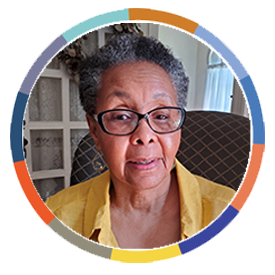
OKELLA PAIGE TRICE
Class of 1962
Looking back, Germantown, the neighborhood and high school conjure up pleasant and unpleasant memories. Growing up in those places and spaces, I had to confront the tensions between race & identity and racism & fairness in myself and American society. These tensions have been a subtext for my life and the basis for my continued work for social justice.
- Germantown – The Community
- High School, Implicit Racial Bias & Identity
- High School Memories, Activities & Daily Life
- A Sample of National & International Events During My High School Years
- Rainbows & Storm Clouds
- Racism, Fairness & Justice
Germantown – The Community
Living in Germantown, PA, from the 5th-grade through college gave me plenty of time to observe the awe and majesty of the enormous trees that lined the cobblestone and brick streets as I walked back and forth between home and school and church. There were the occasional graveyards adjacent to small stone churches, on Germantown Avenue. Those sites remain, housing the history of early Germantown white families. None of my elementary, junior, or high school history teachers taught me the significance of the community where I was growing up. But I always sensed the historical magnitude and importance of these places and spaces.
High School, Implicit Racial Bias & Identity
I arrived at Germantown High School (GHS) in January 1959 from Roosevelt Junior High School. It wasn’t until I was older that I could “name” the tensions and contradictions that I was confronting.
On the one hand, there was the foundational principle of the Quakers and Mennonites — “Do unto others as you would have them do unto you.” On the other hand, there were practices of prejudice and racism.
Looking back, I realize the tensions between “fairness and racism” – between “principles and practices” – shaped my defining experiences. At the time, the strains were extremely uncomfortable. Later, I understood what I was experiencing then. We now call it “routine white privilege” and “implicit racial bias.”
For example, teachers wouldn’t respect me or my culture. One teacher even believed that her pronunciation of my name was the prettier way to say it. White male students demanded that I give them answers to tests. No doubt, they felt they could request. Furthermore, they acted like “I owed them the answers.”
Fortunately, for me, my family life and pride prevented the pressures from causing me to explode psychologically. I withstood the pressures because I never lost my “soul.” I kept sight of who I was.
Another example: In high school, I never really focused on college, and I hadn’t received much encouragement to pursue higher education. However, I soon became aware of how African American students were “systematically tracked” for a “business curriculum.”
Somehow, I graduated high school with academic and business credits, and I attended Bluefield State College, a Historically Black College.
In retrospect, I now know three key things: (i) that students like me didn’t get all the education we should have; and (ii) that I had received a quality educational foundation; and (iii) that my educational experiences – positive and negative ones — prepared me for an ongoing fight for equality and justice for all.
High School Memories, Activities & Daily Life
According to the Germantown High School Yearbook, in 1962, I played badminton, tennis, and volleyball. I was a senator and participated in Class Organization. Ironically, despite “the historical record,” I don’t remember participating in any of these activities. Without the yearbook, I wouldn’t have been able to share with my daughters and granddaughter some of my high school activities.
What do I remember?
- Starting the day with scripture and the pledge of allegiance.
- Disabled students attended class with us.
- Learning how to assist fellow students with medical issues (diabetes and epilepsy) at the beginning of each year.
- An elevator for Disabled Students and Staff. The elevator was never an issue with the student body at-large.
- Thursdays were for Banking with PSFS (Pennsylvania Savings Fund Society), “Wishing Won’t Do It, Saving Will.”
- Purchasing tokens for riding the PTC (Philadelphia Transportation Company.)
- Carrying lunch to school because there was no cafeteria.
- “Air raid” drills.
- Dedication of the new wing; November 9, 1961.
- Germantown High School, Physical Education (P.E.)
- School-wide class participation in the annual city-wide “May Day Physical Education Demonstration.”
- The class of January 1962 was the last graduating group to finish in January. That June, the school system moved to have one graduating class a year rather than two.
A Sample of National & International Events During My High School Years
Below are some news events that happened while I was attending GHS:
- John F. Kennedy elected
- Khrushchev visits the United States
- Roger Maris hits 64 home runs
- Dag Hammarskjold killed in a plane crash over Congo
- TV Quiz Scandals
- Alan Shepard, first American Astronaut
- Princess Margaret weds Mr. Jones
- Yuri Gagarin becomes the first man in space
- Earnest Hemingway dies mysteriously
- Adolf Eichmann captured
- Fifty-Star United States flag adopted
- Olympic Winter Games at Squaw Valley, California
- S. U-2 Reconnaissance plane shot down
- Revolt in Laos
- Riots in Congo
- Clark Gable, The King, is dead
- Floyd Patterson was the first boxer to regain the world heavyweight championship
- Fidel Castro gains power in Cuba
Rainbows & Storm Clouds
When I reflect on my life, sometimes I’m filled with negative thoughts and unpleasant memories. However, sometimes I see rainbows of hope.
For example, today (August 12, 2020), as I’m completing these reflections, there’re news reports that presidential candidate Joe Biden has chosen Kamala Harris as his Vice President running mate. She’s the first African American female to run for this office for the Democratic or Republican parties.
Harris is the daughter of an Indian mother and a Jamaican father. She’s a wife, mother, graduate of Howard University (a Historically Black University), is the second African American Women to be a U. S. Senator, a District Attorney, and an Attorney General.
While I’m hopeful, I see white racism raising its ugly head to thwart Black economic, political, and social advancement. For example, The Republican Party and the current President, Donald J. Trump, have started to seed fear and racism. They’re “running plays” from their go-to playbook whenever descendants of Africa make advances.
Racism, Fairness & Justice
At 76, I know change has occurred. I’ve seen and lived it. But I also know that the more some things have changed, the more others have not. For example, systemic racism continues to exist. It’s been over 400 years since the recording of enslaved Africans in Virginia. And, since March 2020, we’ve been trying to deal with (i) the pandemics of health and racism, (ii) the age-old tensions between racism and fairness, and (iii) the protest these sparked protests across the country.
Come November 3, 2020; I will cast my vote for the fairness principle — “do unto others as you would have them do unto you.” Because I wake up each morning with my mind “stayed” on justice.
Okella’s Contact Information: omtrice@yahoo.com
If you are enjoying The 1960’s Project, please consider making a contribution to the…

I went to school and graduated with Faye. The other Paige family, on W Duval
I invite you to submit your reflections.